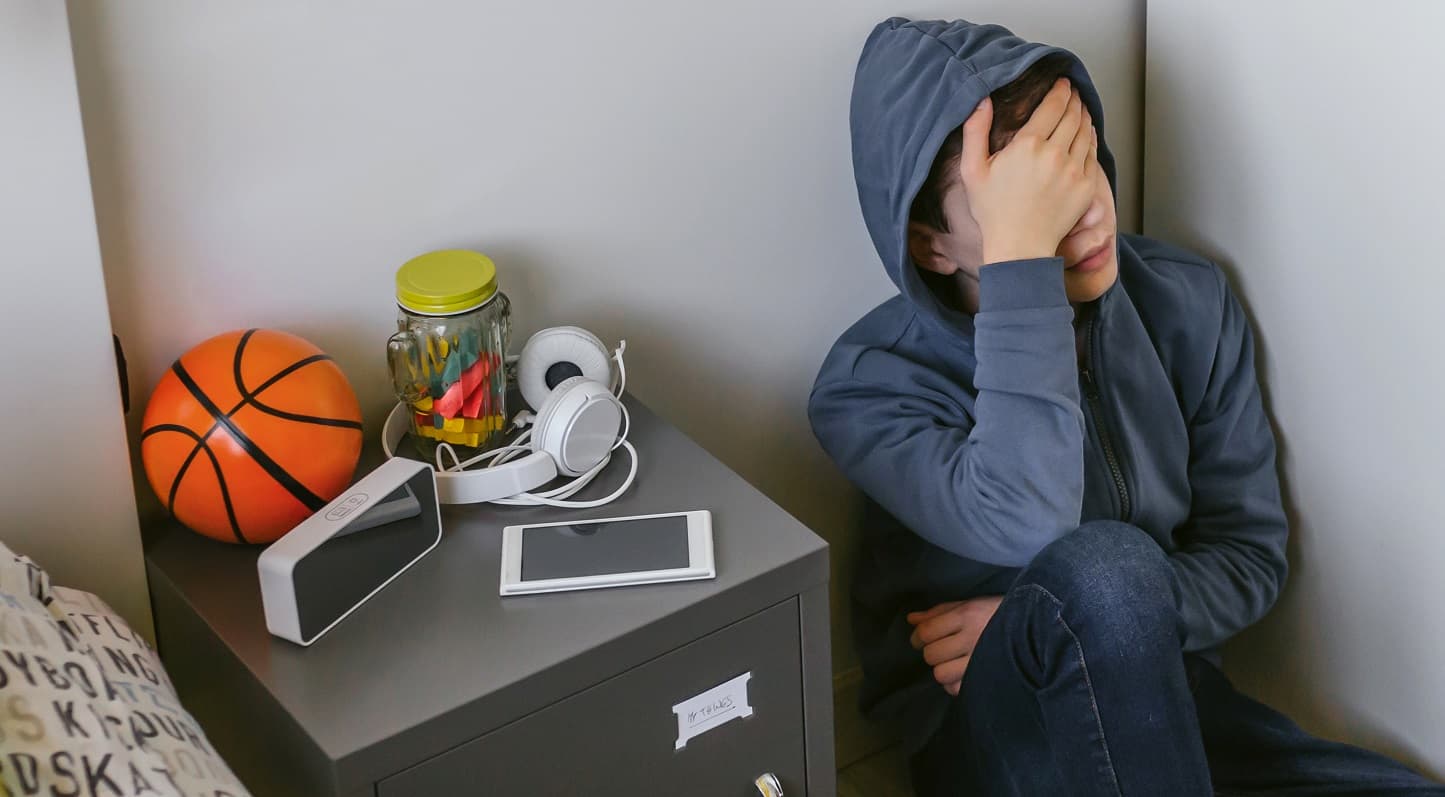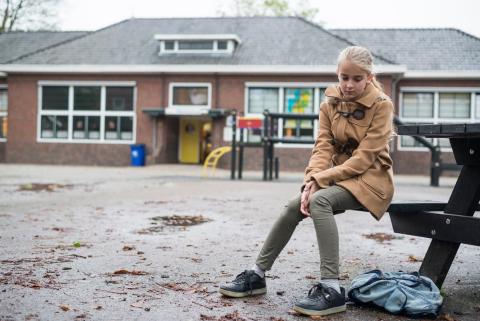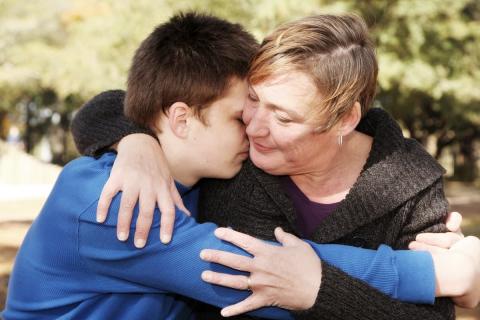The teenage years can be confusing and challenging. Changes to their bodies and brains can result in quick or confusing mood changes. They may swing from feeling over the moon to down in the dumps, for no apparent reason. And this is perfectly normal. But if your child seems to be consistently down, and if this low mood is affecting their daily life and stopping them doing the things they used to enjoy, this could be a sign of depression.
What causes low mood and depression?
Low mood and depression can be triggered by life events and challenges, but sometimes it won’t have an obvious cause at all.
Having your child diagnosed as depressed can be very difficult for parents. But the important thing to remember is that lots of young people go through periods of low mood or depression and, with the right approach, love and support, they come out the other side.
When to be concerned about depression
It can be hard to tell the difference between symptoms of depression and normal teenage emotions. However, it could be a sign of something more significant if:
- your teen’s feelings of sadness, tearfulness, worry or anger don’t seem to go away, and
- these feelings are stopping them getting on with their day-to-day life for a number of weeks, and
- there are changes to their sleep and appetite.
Here are some signs to look out for:
- becoming very withdrawn from family and friends and not wanting to go out or see people
- finding it hard to concentrate, and/or losing interest in activities
- not wanting to do things they used to enjoy
- feeling irritable, angry or frustrated
- feeling tearful, miserable, lonely or hopeless
- feeling empty or numb
- feeling less confident, or being very hard on themselves
- sleeping more or less than usual
- eating more or less than usual
- feeling tired or lacking in energy
- having no motivation
- not looking after themselves properly (for example, not washing or cleaning their clothes)
- starting to self-harm
- experiencing suicidal thoughts.
If your teen is experiencing one of more of these symptoms, it doesn’t necessarily mean they’re depressed. But it’s definitely a good idea to talk to them about it, particularly if the symptoms don’t seem to be going away.
What to do if your teen seems depressed
Tip #1: Talk to them and listen to what they say
Pick a quiet moment when you’re unlikely to be interrupted. It might help if you’re doing something else at the same time, like cooking the tea, driving in the car or going for a walk.
You may want to approach the subject indirectly – for example, you could say that you’ve noticed they seem down and ask if there’s anything on their mind. Remember to really listen to what they say, rather than worrying about what you’re going to say in response. And try not to forget that what might seem trivial to you can seem huge and overwhelming to them, so always take what they say seriously and don’t dismiss it. Try not to be critical of them and focus on listening to what they are saying.
It could be that there’s something specific bothering them, like a row with a friend or an issue at school. In this case, you could work together to find a solution.
Our page on talking and listening to your teen has more tips.
Tip #2: Try not to take it personally
If they’re not ready to open up to you, or they react angrily or rudely, don’t let it get to you.
It can be hard not to feel you're at fault or you've not done enough to help them, but just let them know you’re there when they do want to talk.
You could also suggest they talk to someone else, another family member or friend perhaps. Just thinking about the other people in their support circle they could turn to may help them feel less alone. They could also talk to their GP or call a helpline (see ‘get professional help’ below).
Tip #3: Make plans together
If you see your teen is struggling or hurting it can be so tempting to swoop in and try to ‘fix’ everything. But instead, try to focus on listening and being there for them. This may be all they need from you.
Your child won’t take kindly to being told what to do, so instead you could ask them to think of options that could help, and then take their lead. This will help them build their problem-solving skills, and make them feel more in control of the situation.
People experiencing depression can find it hard to believe that anything will make a difference to how they feel. But research shows that there are lots of things we can do to improve our wellbeing, like connecting with friends, keeping active, getting involved in hobbies and interests and helping other people.
Tip #4: Encourage them to do things they enjoy
If your teen has lost interest in the things that used to make them happy, try to gently encourage them to have another go. Don’t push them, but talk to them about what they enjoyed about the activity and about how they can try it again if they want to and how you can support them to do this.
If they’ve no interest in getting back into their activities (or if these activities are making the problem worse) you could try encouraging them to have a go at something new. You could suggest they look at Childline’s coping kit, which includes lots of different activities to help lift the spirits.
Tip #5: Encourage them to keep to a healthy routine
It’s amazing how eating healthily, exercising and getting enough sleep can make us feel so much better. So try to encourage your teen to stick to a daily routine that supports their wellbeing.
Perhaps you could agree on some healthy habits to try together, like 10 minutes of yoga a day, making sure you get your ‘five a day’ of fruit and veg or going to bed earlier. Did you know teens need between 8 and 10 hours of sleep a night? Our page on sleep tips for teens has more advice.
Tip #6: Get professional help
If you’ve tried talking and making changes to their routine and nothing has improved, it may be time to get professional help. This could be from:
- their teacher or a guidance teacher at school
- your GP
- an adviser at an organisation like Childline or The Mix – our page on getting support has more suggestions
- a counsellor, therapist or psychologist – your GP can help refer you to someone in your area.
Again, talk to your teen about who they feel most comfortable turning to.
You can find out more about the symptoms and treatments for depression on the YoungMinds website.
Tip #7: Be patient
Living with someone with depression can be upsetting and frustrating. You may wish they could do more to help themselves ‘cheer up’ or ‘snap out of it’. But this isn’t how depression works – it’s an illness, and your child can’t ‘decide’ to get better, any more than they can ‘decide’ not to have the flu. Your child hasn’t chosen to feel depressed, and they’re not doing it on purpose to upset the family. Like any illness, they need time to recover.
Try to think about how you would support your child with a physical illness and use similar strategies, such as trying to look after them and not blaming them for being unwell.
Tip #8: Look after yourself
Coping with a teenager can be stressful and exhausting. So make sure you look after yourself too, or you won’t be able to support them – not to mention any other brothers or sisters. Our pages on mental health advice for parents and coping with parenting when you're raising a teen have tips to help.
 Activities & Play
Activities & Play Behaviour
Behaviour Childcare
Childcare Development & Growing Up
Development & Growing Up Family, Friends & Relationships
Family, Friends & Relationships Feeding Your Baby
Feeding Your Baby Food & Eating
Food & Eating Health & Safety
Health & Safety Mental Health & Wellbeing
Mental Health & Wellbeing Money & Work
Money & Work Online Behaviour & Safety
Online Behaviour & Safety Pregnancy & First Days
Pregnancy & First Days School & Education
School & Education Sleep
Sleep












 Behaviour
Behaviour
 Family, Friends & Relationships
Family, Friends & Relationships